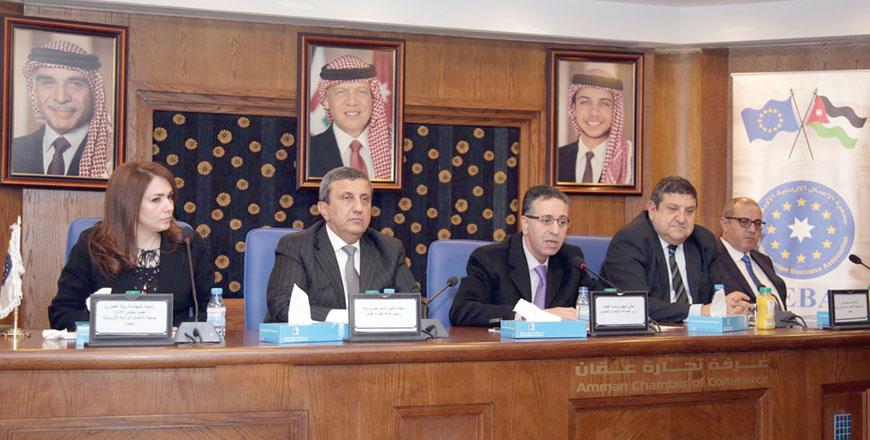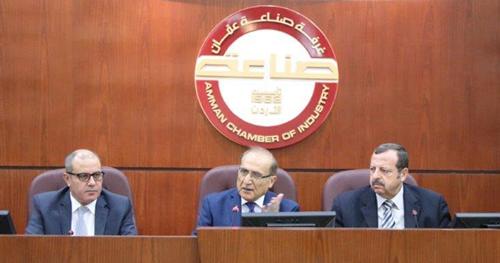You are here
Six companies meet Jordanian-EU deal requirements — Qudah
By JT - Dec 20,2016 - Last updated at Dec 20,2016

Minister of Industry, Trade and Supply Yarub Qudah addresses industrialists in Amman on Monday at a meeting organised by Jordan Europe Business Association (Petra photo)
AMMAN — Six Jordanian companies have so far completed the procedures deemed necessary to start exporting their products to the European market under the Jordanian-EU agreement on simplified rules of origin, Minister of Industry, Trade and Supply Yarub Qudah said on Monday, urging Jordanian businessmen to work further to maximise their benefit from the deal.
Speaking at a meeting organised by the Jordan Europe Business Association (JEBA), he explained that the government has taken steps to assist the industrial sector, encouraging Syrian refugees to work at the developmental and industrial estates, covered by the deal, the Jordan News Agency, Petra, reported.
Under the deal, Syrian refugees have been exempted from work permit fees and they will continue to have a refugee-status and receive aid from the UNHCR in the event of working in accordance with the law.
The deal seeks to provide more job opportunities for Jordanians through the expansion of industrial projects and drawing new investments, the minister said, pointing out that only 15 per cent of factories’ workforce should be Syrians.
As more local products enter the European market, more jobs will be created, he reiterated, addressing the attendees.
When the total number of Syrians with work permits reaches 200,000, all industrial estates will be able to benefit from the EU deal under the “relaxed” rules of origin.
In cooperation with concerned bodies, the industry and trade ministry has drawn up a plan to promote the local products that are meant to be exported to the European markets, Qudah noted.
At a meeting for Jordanian businessmen with their EU counterparts, scheduled for January 25, industrialists will have a chance to meet with importers and discuss deals, he said, calling again on Jordanian industrialists to benefit from the Jordanian-EU agreement.
During the meeting, Secretary General of the Ministry of Industry, Trade and Supply Yousef Shamali briefed the attendees on the agreement.
The Kingdom’s exports to the EU totalled JD144 million in 2002 and rose to JD206 million in 2014, but dropped to JD123 million in 2015, while its imports from the EU rose to JD3.1 billion in 2015 from JD1 billion in 2002, according to Petra.
According to JEBA President Jamal Fariz, who attended the meeting, the exporting process to the EU can still be improved.
However, failure to promote local products as much as needed, in addition to excluding agricultural and food products from the deal, will pose challenges for the private sector when exporting to Europe, he noted.
Related Articles
AMMAN — Jordanian products have the opportunity to access European markets due to their "high quality and competitive features", President o
AMMAN — The private sector must take the initiative in order to benefit from the Jordanian-EU agreement on simplified rules of origin, a gov
AMMAN — Exports of Jordan-made products to Europe are expected to increase following a deal with the EU stipulating “relaxed” rules of origi


















